Ai Qing's Poetry Audiobook: Exploring History and Resilience
Immerse yourself in the audiobook preview of Ai Qing’s 'Selected Poems,' a celebrated Chinese poet. This journey uncovers themes of political struggle, family heritage, and poetry’s enduring strength. Translated by Robert Dorsett, Ai Qing’s insights reach English-speaking listeners, with a foreword by Ai Weiwei and narrations by David Shih and Nancy Wu. This article examines the audiobook’s preface, highlighting the anthology’s cultural and historical significance.
Key Points
Ai Qing’s prominence in modern Chinese poetry.
The influence of political repression on Ai Qing’s life and art.
Robert Dorsett’s approach to translation.
Ai Weiwei’s foreword on family legacy and creative freedom.
Poetry as a tool for resistance.
The role of vernacular Chinese in conveying truth simply.
Unveiling Ai Qing’s 'Selected Poems' Audiobook Preview
Introducing Ai Qing and His Enduring Legacy
Ai Qing
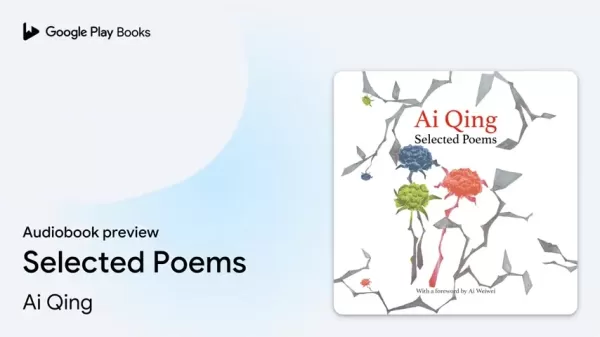
(1910-1996) remains a towering figure in modern Chinese poetry. His work reflects a profound sense of social duty and a commitment to capturing the truths of his era. The audiobook 'Selected Poems' provides a rich introduction to his lasting influence and artistic achievements. Beyond its lyrical beauty, this anthology offers a window into Chinese history and culture, illuminating the nation’s tumultuous 20th century—a time of revolution, conflict, and political turmoil. Through Ai Qing’s poetry, listeners gain a unique perspective on these events, exploring the human experience in extraordinary times.
Political Repression’s Impact on Ai Qing’s Poetry
The audiobook preview underscores the intense political suppression Ai Qing endured throughout his career.
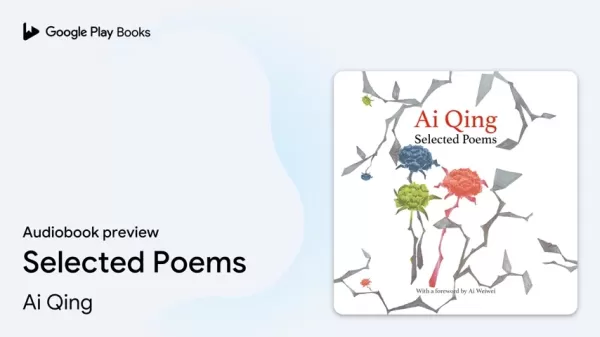
Banned from writing for years, his struggles highlight poetry’s power as a form of defiance against censorship and control. During the Cultural Revolution, Ai Qing was exiled to the Gobi Desert in Xinjiang, forced into manual labor and “ideological reform” cleaning public restrooms in a labor camp. The preview showcases this ordeal, presenting his poetry as a symbol of hope and human resilience. Though the regime aimed to silence him, it failed to crush his spirit. The 'Translator’s Introduction' further explores this defiance, emphasizing poetry’s subversive role against oppressive power.
Robert Dorsett’s Translation Philosophy
Robert Dorsett’s translation of Ai Qing’s poetry bridges Chinese and English-speaking worlds. The preview features Dorsett reading his translator’s note, shedding light on his method for capturing Ai Qing’s intricate themes and distinctive style. Dorsett’s approach balances fidelity to the original poems with accessibility for diverse readers, preserving the poet’s voice while making it resonate across cultures. This commitment reflects the artistry and responsibility inherent in translation.
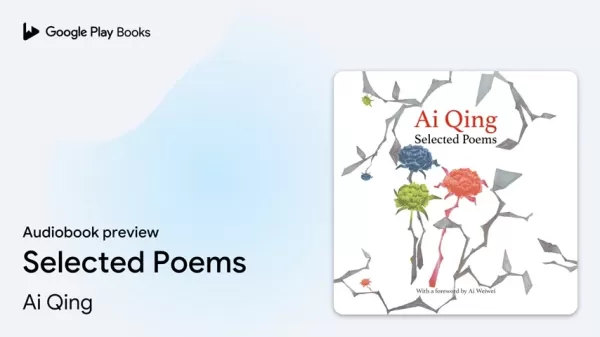
For Ai Qing, poetry was life itself. Each translation choice by Dorsett carries weight, ensuring the poet’s essence endures in English.
Ai Weiwei’s Foreword and Family Heritage
Ai Weiwei, Ai Qing’s son and a globally recognized artist, provides a foreword that enriches the audiobook with personal insight.
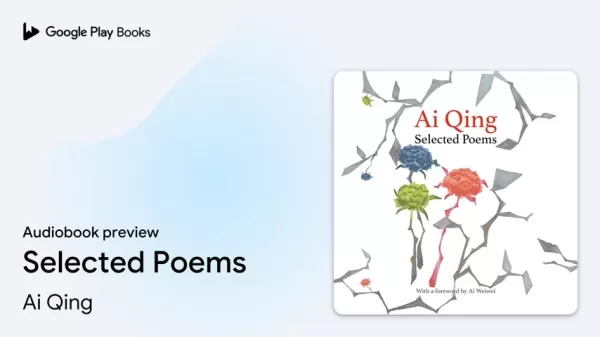
Weiwei reflects on his father’s life and creative path, offering a heartfelt view of Ai Qing’s challenges and victories. This section delves into themes of family heritage, artistic liberty, and the realities of political oppression. Weiwei notes that Ai Qing’s renowned poem, Dah Yanho, captivated many with its style. This collection weaves a century-long narrative of China’s history.
David Shih and Nancy Wu’s Narration
David Shih and Nancy Wu bring Ai Qing’s poetry to life with their readings, capturing the emotional depth of each translated word. Their narrations enhance the listening experience, conveying the intended sentiment of the poems. Listeners are encouraged to engage with their performances to fully appreciate the anthology.
In-Depth Analysis of Themes
Poetry’s Role in Defying Autocracy
Ai Weiwei’s foreword emphasizes the timeless themes in Ai Qing’s work, particularly its bold resistance to autocracy and advocacy for individual expression. These ideas are reinforced by the translator’s notes, preface, and narrators’ readings, underscoring the anthology’s core message.
Art as a Subversive Force
The preview suggests Ai Qing’s poems challenge the aesthetic constraints of authoritarianism. Poetry, as an art form, crafts truth and defies oppressive power, carrying significant weight through the poet’s expressive voice.
Chronicling the People’s Struggle
Beyond a personal story, this anthology narrates the collective struggles of many. Ai Qing’s poetry aims to honor the enduring legacy of the Chinese people’s resilience as they rebuilt a nation from the ashes of 20th-century violence.
Maximizing Your Audiobook Experience
Step-by-Step Tips
To fully engage with this anthology, consider these steps:
- Choose a Quiet Space: Reduce distractions to focus on the poetry and narration.
- Read Along: Use a printed or digital copy of the book for deeper understanding.
- Pause for Reflection: Take breaks to absorb the poems’ emotions and meanings.
- Embrace the Narration: Pay attention to David Shih and Nancy Wu’s readings.
Availability and Access
Stream 'Selected Poems' on Google Play Books
The 'Selected Poems' audiobook is accessible on Google Play Books, offering an easy way to experience this significant work.
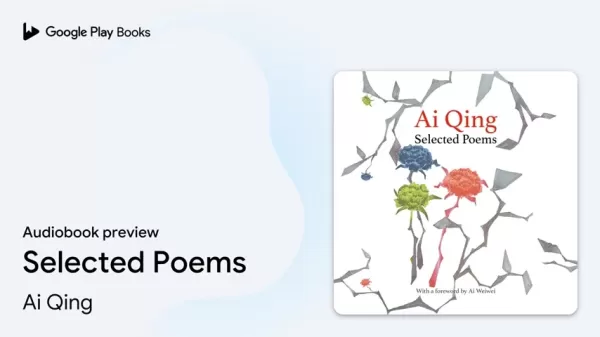
Visit Google Play Books for details and explore related audiobooks. Check the video description for additional information.
Assessing 'Selected Poems': Strengths and Limitations
Pros
Provides deep insights into Ai Qing’s life and legacy.
Addresses critical themes of political struggle and artistic expression.
Includes contributions from Robert Dorsett and Ai Weiwei.
Serves as a thorough introduction to modern Chinese poetry.
Cons
The preview may not fully represent Ai Qing’s complete body of work.
Requires familiarity with Chinese history for deeper appreciation.
Less impactful than the full audiobook experience.
FAQ
Who is Ai Qing?
Ai Qing (1910-1996) was a leading Chinese poet, celebrated for his socially engaged poetry and reflections on China’s history. His life was shaped by the political upheavals of 20th-century China.
What themes are explored in 'Selected Poems'?
The anthology examines political repression, artistic freedom, family heritage, and poetry’s role as resistance. It reflects on China’s turbulent 20th century and the human experience in challenging times.
Who is Robert Dorsett?
Robert Dorsett translated 'Selected Poems,' connecting Chinese and English-speaking audiences. His translator’s note reveals his approach to preserving Ai Qing’s poetic essence.
Who are David Shih and Nancy Wu?
David Shih and Nancy Wu narrate the audiobook, bringing emotional depth to the poetry.
Why is Ai Weiwei’s contribution important?
Ai Weiwei, Ai Qing’s son, offers a foreword that adds a personal perspective, reflecting on his father’s life, legacy, and the challenges of political oppression.
Related Questions
How did political oppression shape Ai Qing’s poetry?
Political repression deeply influenced Ai Qing’s work, restricting his freedom and leading to his exile. Yet, his poetry emerged as a powerful testament to resilience and artistic defiance. His experiences highlight the importance of protecting free speech and creative expression, positioning artists as voices for change. Ai Weiwei’s preface expresses gratitude for sharing his father’s work with a global audience Ai Qing never imagined.
Related article
 AI's Expanding Role: Addressing Bias and Ethical Challenges
Artificial Intelligence (AI) continues to transform modern life, shaping how we consume news, engage with YouTube, and interact online. Yet, its rapid rise sparks critical questions about bias and soc
AI's Expanding Role: Addressing Bias and Ethical Challenges
Artificial Intelligence (AI) continues to transform modern life, shaping how we consume news, engage with YouTube, and interact online. Yet, its rapid rise sparks critical questions about bias and soc
 Napkin AI: Elevate Business Storytelling with Text-to-Visual Transformation
In today's fast-moving digital landscape, clear communication is critical. Napkin AI is a dynamic tool for professionals aiming to amplify their storytelling. This advanced visual AI platform converts
Napkin AI: Elevate Business Storytelling with Text-to-Visual Transformation
In today's fast-moving digital landscape, clear communication is critical. Napkin AI is a dynamic tool for professionals aiming to amplify their storytelling. This advanced visual AI platform converts
 Side Events Unveiled for TechCrunch Sessions: AI in Boston
Elevate your TechCrunch Sessions: AI experience with an exciting array of Side Events sweeping through Boston from June 1-7.As TechCrunch Sessions: AI approaches, we’re excited to reveal our Side Even
Comments (0)
0/200
Side Events Unveiled for TechCrunch Sessions: AI in Boston
Elevate your TechCrunch Sessions: AI experience with an exciting array of Side Events sweeping through Boston from June 1-7.As TechCrunch Sessions: AI approaches, we’re excited to reveal our Side Even
Comments (0)
0/200
Immerse yourself in the audiobook preview of Ai Qing’s 'Selected Poems,' a celebrated Chinese poet. This journey uncovers themes of political struggle, family heritage, and poetry’s enduring strength. Translated by Robert Dorsett, Ai Qing’s insights reach English-speaking listeners, with a foreword by Ai Weiwei and narrations by David Shih and Nancy Wu. This article examines the audiobook’s preface, highlighting the anthology’s cultural and historical significance.
Key Points
Ai Qing’s prominence in modern Chinese poetry.
The influence of political repression on Ai Qing’s life and art.
Robert Dorsett’s approach to translation.
Ai Weiwei’s foreword on family legacy and creative freedom.
Poetry as a tool for resistance.
The role of vernacular Chinese in conveying truth simply.
Unveiling Ai Qing’s 'Selected Poems' Audiobook Preview
Introducing Ai Qing and His Enduring Legacy
Ai Qing

(1910-1996) remains a towering figure in modern Chinese poetry. His work reflects a profound sense of social duty and a commitment to capturing the truths of his era. The audiobook 'Selected Poems' provides a rich introduction to his lasting influence and artistic achievements. Beyond its lyrical beauty, this anthology offers a window into Chinese history and culture, illuminating the nation’s tumultuous 20th century—a time of revolution, conflict, and political turmoil. Through Ai Qing’s poetry, listeners gain a unique perspective on these events, exploring the human experience in extraordinary times.
Political Repression’s Impact on Ai Qing’s Poetry
The audiobook preview underscores the intense political suppression Ai Qing endured throughout his career.

Banned from writing for years, his struggles highlight poetry’s power as a form of defiance against censorship and control. During the Cultural Revolution, Ai Qing was exiled to the Gobi Desert in Xinjiang, forced into manual labor and “ideological reform” cleaning public restrooms in a labor camp. The preview showcases this ordeal, presenting his poetry as a symbol of hope and human resilience. Though the regime aimed to silence him, it failed to crush his spirit. The 'Translator’s Introduction' further explores this defiance, emphasizing poetry’s subversive role against oppressive power.
Robert Dorsett’s Translation Philosophy
Robert Dorsett’s translation of Ai Qing’s poetry bridges Chinese and English-speaking worlds. The preview features Dorsett reading his translator’s note, shedding light on his method for capturing Ai Qing’s intricate themes and distinctive style. Dorsett’s approach balances fidelity to the original poems with accessibility for diverse readers, preserving the poet’s voice while making it resonate across cultures. This commitment reflects the artistry and responsibility inherent in translation.

For Ai Qing, poetry was life itself. Each translation choice by Dorsett carries weight, ensuring the poet’s essence endures in English.
Ai Weiwei’s Foreword and Family Heritage
Ai Weiwei, Ai Qing’s son and a globally recognized artist, provides a foreword that enriches the audiobook with personal insight.

Weiwei reflects on his father’s life and creative path, offering a heartfelt view of Ai Qing’s challenges and victories. This section delves into themes of family heritage, artistic liberty, and the realities of political oppression. Weiwei notes that Ai Qing’s renowned poem, Dah Yanho, captivated many with its style. This collection weaves a century-long narrative of China’s history.
David Shih and Nancy Wu’s Narration
David Shih and Nancy Wu bring Ai Qing’s poetry to life with their readings, capturing the emotional depth of each translated word. Their narrations enhance the listening experience, conveying the intended sentiment of the poems. Listeners are encouraged to engage with their performances to fully appreciate the anthology.
In-Depth Analysis of Themes
Poetry’s Role in Defying Autocracy
Ai Weiwei’s foreword emphasizes the timeless themes in Ai Qing’s work, particularly its bold resistance to autocracy and advocacy for individual expression. These ideas are reinforced by the translator’s notes, preface, and narrators’ readings, underscoring the anthology’s core message.
Art as a Subversive Force
The preview suggests Ai Qing’s poems challenge the aesthetic constraints of authoritarianism. Poetry, as an art form, crafts truth and defies oppressive power, carrying significant weight through the poet’s expressive voice.
Chronicling the People’s Struggle
Beyond a personal story, this anthology narrates the collective struggles of many. Ai Qing’s poetry aims to honor the enduring legacy of the Chinese people’s resilience as they rebuilt a nation from the ashes of 20th-century violence.
Maximizing Your Audiobook Experience
Step-by-Step Tips
To fully engage with this anthology, consider these steps:
- Choose a Quiet Space: Reduce distractions to focus on the poetry and narration.
- Read Along: Use a printed or digital copy of the book for deeper understanding.
- Pause for Reflection: Take breaks to absorb the poems’ emotions and meanings.
- Embrace the Narration: Pay attention to David Shih and Nancy Wu’s readings.
Availability and Access
Stream 'Selected Poems' on Google Play Books
The 'Selected Poems' audiobook is accessible on Google Play Books, offering an easy way to experience this significant work.

Visit Google Play Books for details and explore related audiobooks. Check the video description for additional information.
Assessing 'Selected Poems': Strengths and Limitations
Pros
Provides deep insights into Ai Qing’s life and legacy.
Addresses critical themes of political struggle and artistic expression.
Includes contributions from Robert Dorsett and Ai Weiwei.
Serves as a thorough introduction to modern Chinese poetry.
Cons
The preview may not fully represent Ai Qing’s complete body of work.
Requires familiarity with Chinese history for deeper appreciation.
Less impactful than the full audiobook experience.
FAQ
Who is Ai Qing?
Ai Qing (1910-1996) was a leading Chinese poet, celebrated for his socially engaged poetry and reflections on China’s history. His life was shaped by the political upheavals of 20th-century China.
What themes are explored in 'Selected Poems'?
The anthology examines political repression, artistic freedom, family heritage, and poetry’s role as resistance. It reflects on China’s turbulent 20th century and the human experience in challenging times.
Who is Robert Dorsett?
Robert Dorsett translated 'Selected Poems,' connecting Chinese and English-speaking audiences. His translator’s note reveals his approach to preserving Ai Qing’s poetic essence.
Who are David Shih and Nancy Wu?
David Shih and Nancy Wu narrate the audiobook, bringing emotional depth to the poetry.
Why is Ai Weiwei’s contribution important?
Ai Weiwei, Ai Qing’s son, offers a foreword that adds a personal perspective, reflecting on his father’s life, legacy, and the challenges of political oppression.
Related Questions
How did political oppression shape Ai Qing’s poetry?
Political repression deeply influenced Ai Qing’s work, restricting his freedom and leading to his exile. Yet, his poetry emerged as a powerful testament to resilience and artistic defiance. His experiences highlight the importance of protecting free speech and creative expression, positioning artists as voices for change. Ai Weiwei’s preface expresses gratitude for sharing his father’s work with a global audience Ai Qing never imagined.
 AI's Expanding Role: Addressing Bias and Ethical Challenges
Artificial Intelligence (AI) continues to transform modern life, shaping how we consume news, engage with YouTube, and interact online. Yet, its rapid rise sparks critical questions about bias and soc
AI's Expanding Role: Addressing Bias and Ethical Challenges
Artificial Intelligence (AI) continues to transform modern life, shaping how we consume news, engage with YouTube, and interact online. Yet, its rapid rise sparks critical questions about bias and soc
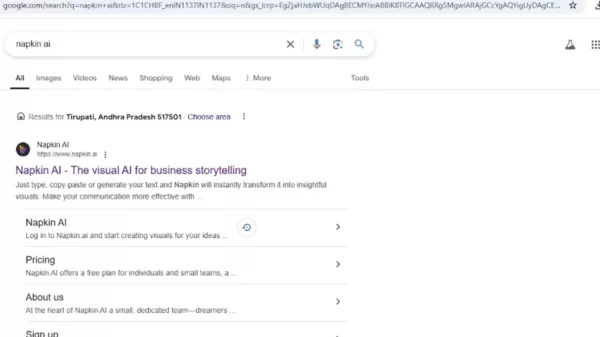 Napkin AI: Elevate Business Storytelling with Text-to-Visual Transformation
In today's fast-moving digital landscape, clear communication is critical. Napkin AI is a dynamic tool for professionals aiming to amplify their storytelling. This advanced visual AI platform converts
Napkin AI: Elevate Business Storytelling with Text-to-Visual Transformation
In today's fast-moving digital landscape, clear communication is critical. Napkin AI is a dynamic tool for professionals aiming to amplify their storytelling. This advanced visual AI platform converts
 Side Events Unveiled for TechCrunch Sessions: AI in Boston
Elevate your TechCrunch Sessions: AI experience with an exciting array of Side Events sweeping through Boston from June 1-7.As TechCrunch Sessions: AI approaches, we’re excited to reveal our Side Even
Side Events Unveiled for TechCrunch Sessions: AI in Boston
Elevate your TechCrunch Sessions: AI experience with an exciting array of Side Events sweeping through Boston from June 1-7.As TechCrunch Sessions: AI approaches, we’re excited to reveal our Side Even





























